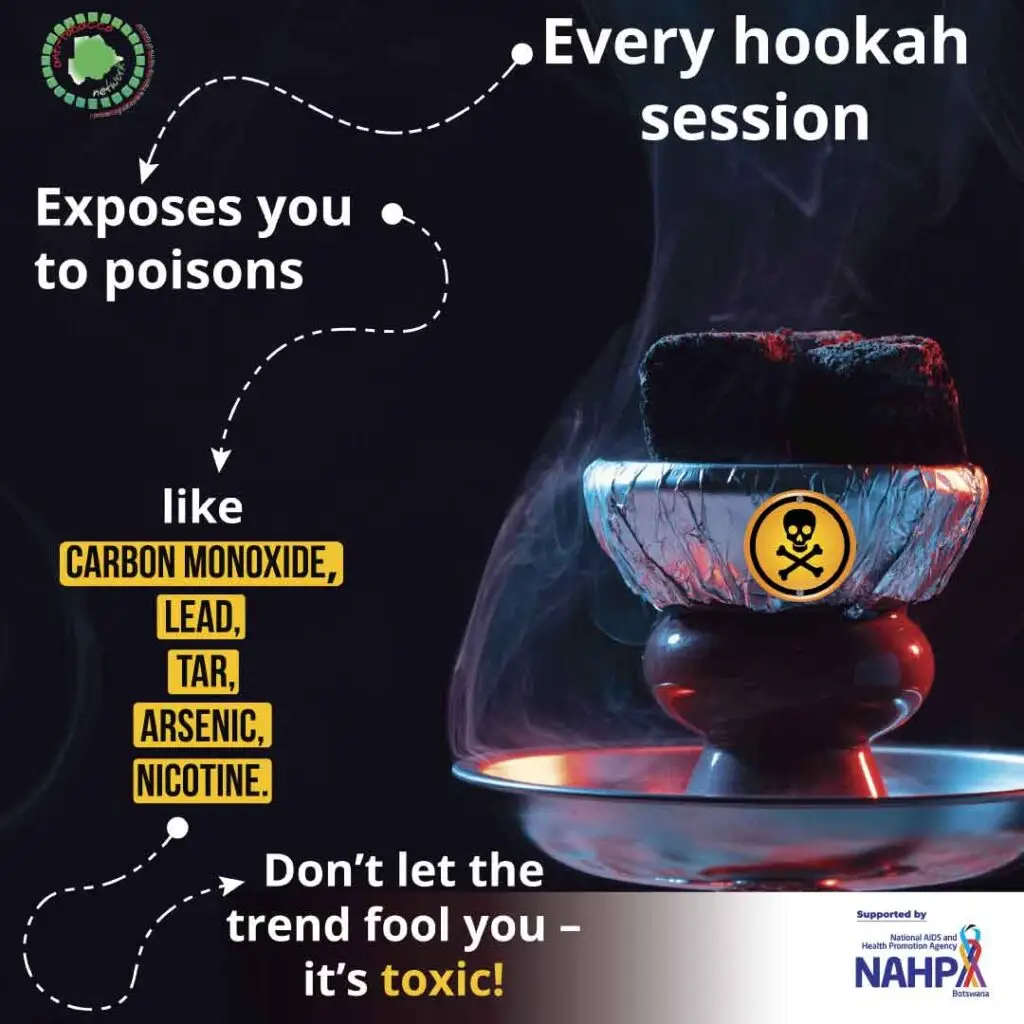Shisha smoke contains a variety of harmful toxins and carcinogens, many of which are also found in cigarette smoke, but in higher concentrations due to the nature of the smoking process. Here are some of the key dangerous substances found in Shisha:
𝐂𝐚𝐫𝐛𝐨𝐧 𝐌𝐨𝐧𝐨𝐱𝐢𝐝𝐞 (𝐂𝐎) – A colorless, odorless gas that can reduce the oxygen supply in your blood, leading to headaches, dizziness, and long-term cardiovascular and neurological damage.
𝐓𝐚𝐫 – A sticky substance that can build up in the lungs, leading to respiratory diseases such as chronic bronchitis and emphysema. Tar also contains carcinogenic compounds that increase the risk of cancer.
𝐍𝐢𝐜𝐨𝐭𝐢𝐧𝐞 – The addictive substance found in tobacco. Nicotine can lead to addiction and has a range of harmful effects on the cardiovascular system, increasing the risk of heart disease and stroke.
𝐅𝐨𝐫𝐦𝐚𝐥𝐝𝐞𝐡𝐲𝐝𝐞 – A known carcinogen used in the preservation of biological specimens, formaldehyde can cause respiratory issues and has been linked to various types of cancer.
𝐁𝐞𝐧𝐳𝐞𝐧𝐞 – A carcinogenic chemical also found in car exhaust and industrial pollution. Long-term exposure to benzene can lead to leukemia and other cancers.
𝐀𝐫𝐬𝐞𝐧𝐢𝐜 – A toxic element that can cause cancer, skin lesions, and damage to the nervous system. It is also associated with an increased risk of lung cancer.
𝐋𝐞𝐚𝐝 – A toxic heavy metal that can cause neurological damage, especially in children, and may also contribute to kidney disease and high blood pressure.
𝐇𝐲𝐝𝐫𝐨𝐠𝐞𝐧 𝐂𝐲𝐚𝐧𝐢𝐝𝐞 – A deadly gas that can cause respiratory failure, brain damage, and even death in high concentrations. It is also linked to heart disease and cancer.
𝐏𝐨𝐥𝐲𝐜𝐲𝐜𝐥𝐢𝐜 𝐀𝐫𝐨𝐦𝐚𝐭𝐢𝐜 𝐇𝐲𝐝𝐫𝐨𝐜𝐚𝐫𝐛𝐨𝐧𝐬 (𝐏𝐀𝐇𝐬) – A group of chemicals found in tobacco smoke that are known to cause cancer, particularly lung and skin cancers.
𝐀𝐜𝐞𝐭𝐚𝐥𝐝𝐞𝐡𝐲𝐝𝐞 – A toxic chemical that can irritate the respiratory system and has been identified as a potential carcinogen.
These harmful substances are produced when tobacco is burned in the Shisha pipe. The water in the pipe does not filter them out, as many believe. Instead, it only cools the smoke, making it easier to inhale deeper and longer, which can actually increase exposure to these toxic chemicals. So, whether it’s through secondhand smoke or direct exposure, Shisha smoking carries significant health risks for both the smoker and those nearby.
Proudly supported by the National AIDS & Health Promotion Agency and Humana People to People Botswana





